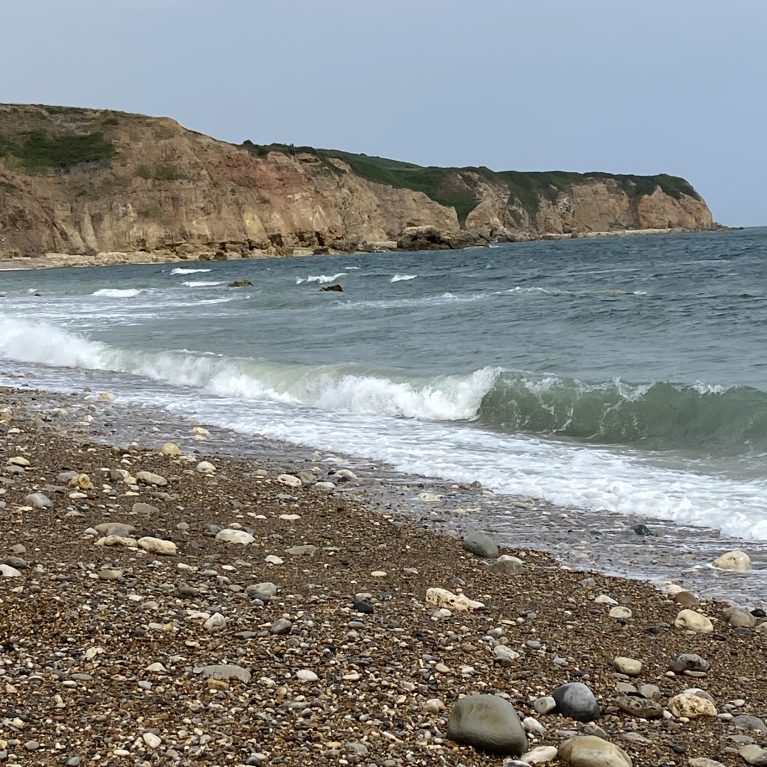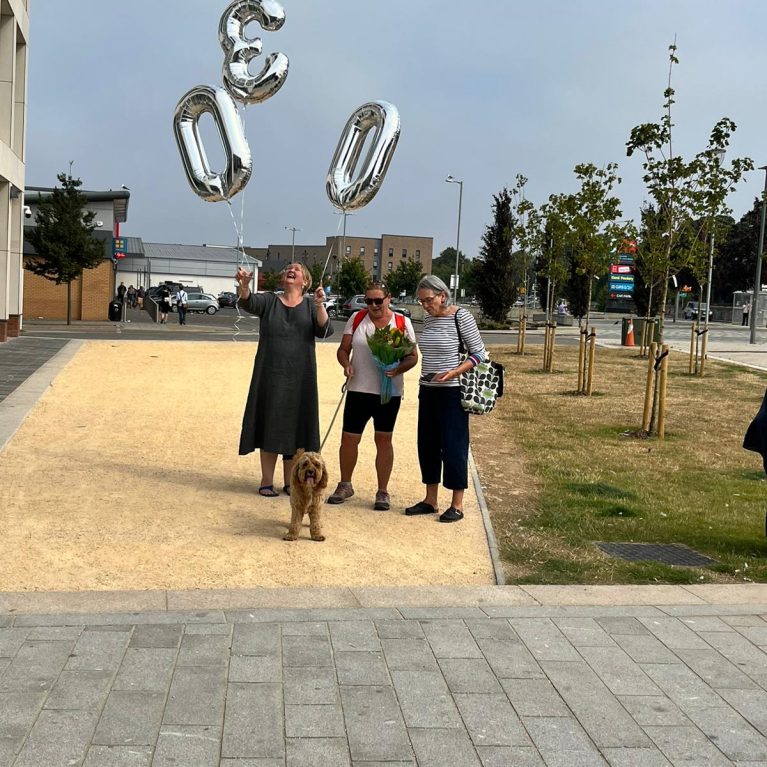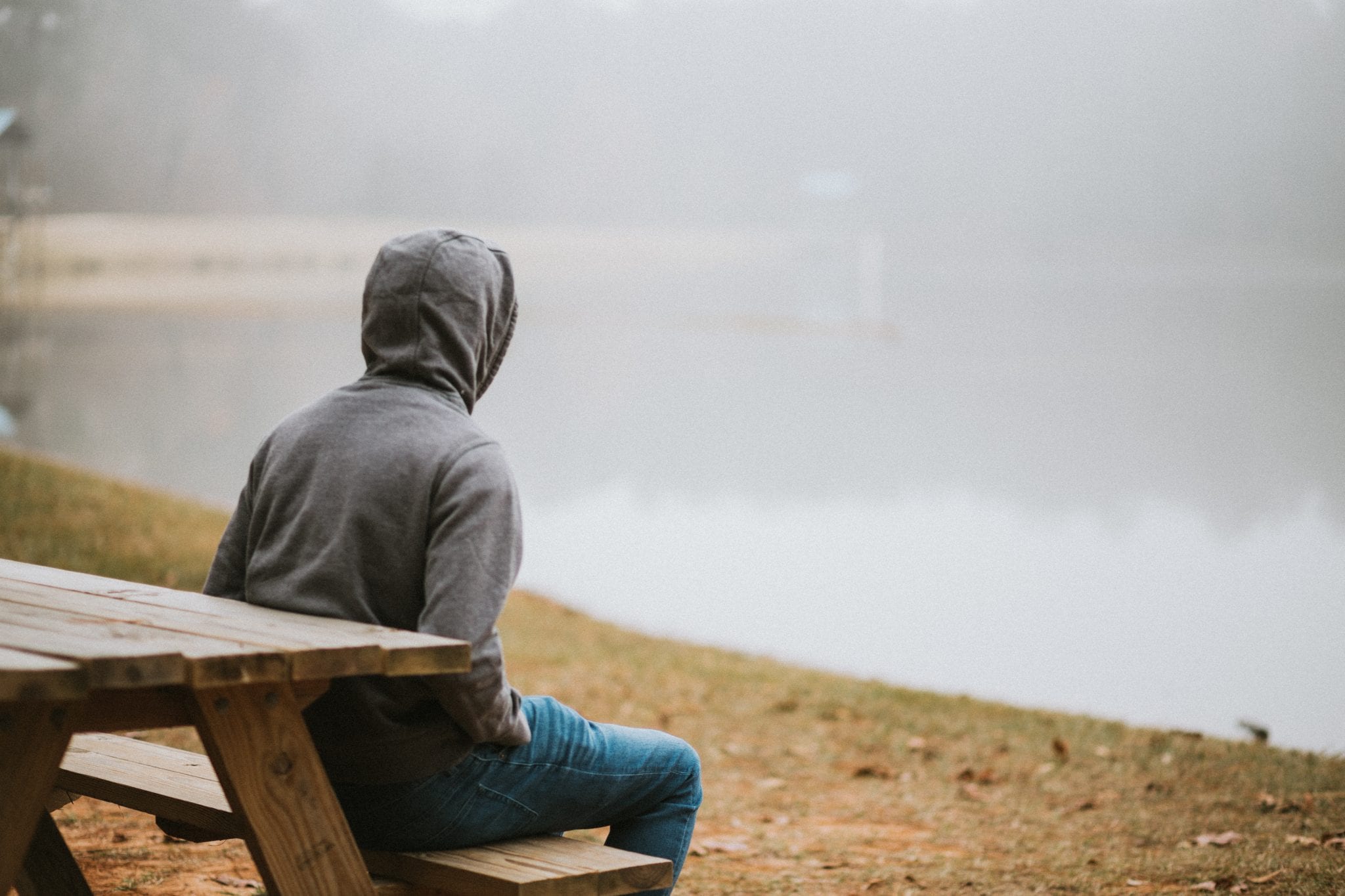Shona, who Future Pathways has been supporting, recently completed a 300-mile walk from Yorkshire to Edinburgh to raise funds for the charity Steps to Hope. It wasn’t easy – she had to overcome some tough challenges, both mental and physical. Here’s her story.
Shona works as a mental health practitioner and a counsellor. Last year she decided that she wanted to help the charity Steps to Hope, whose work to help people suffering from homelessness and addiction is very close to her heart. So what’s the best way to help a charity called Steps to Hope? Walking, of course!
Shona decided to do a sponsored walk from Yorkshire to the school where she works. She organised it all herself and did the walk without any support team apart from her dog, Milo, for the last few days. She carried her tent and all her other equipment herself, in a rucksack that weighed about 15kg – that’s about as heavy as an average three-year-old child.
Shona describes the route: “I started at Helmsley, in North Yorkshire. I then followed the Cleveland Way until I got to Robin Hoods Bay on the east coast of England. And then from there I walked to Edinburgh. The route should have been 300 miles exactly, although I went off track a few times so I ended up doing 314 miles.”

View of the beach during Shona’s walk from Yorkshire to Edinburgh
Although Shona has always enjoyed going for walks, and had found it very helpful for her mental health, the idea of doing a 300-mile walk was very daunting. Shona says: “I would never have done a walk at all without all the counselling I’ve had through Future Pathways. I’ve been involved with them for about three and a half years and they’ve helped me massively. Last year my brother died, and I really wanted to do something in his memory. I just thought, ‘I’m going to push myself, I’m going to go and do it’.” Her target was to raise £2,000.”
Shona put a lot of work into training so that she was ready to tackle the walk. “I trained for six months. I’m 55 – it’s not like I’m a spring chicken – and also I broke my leg a few years ago. I would walk home from school carrying a full-weight pack: it’s nine miles from the school to my house. In the end, I decided that the only way to find out if I was fit enough to do the walk was to actually try to do it.”
‘The walk definitely did push my boundaries but it was amazing.’
Shona started her walk in July this year. The plan was to take about two weeks to do the whole trip. In the end it took a bit longer, because – to put it mildly – Shona had to overcome some challenges along the way. On the second night, Shona’s tent was destroyed. “The winds were so wild up on the moors, and it was raining really hard so my tent was absolutely saturated, and a huge big rip went in the back of it. After that I stayed in B&Bs and hostels, but for the second bit of the walk after Berwick I camped the whole way.”
The second bit? “Yes, near Berwick I slipped and fell on an overgrown trail. I caught my foot in some roots, tripped and split my head open and fractured my eye socket. The damage was worse because my pack was so heavy. The doctors said I had to stop, so I stopped for twelve days. And as soon as they gave me the go-ahead to go back, I went back and finished the walk. I didn’t start at the exact point where I’d fallen, so at a later point I did one trail three times to make up the miles.”

Shona celebrating the end of her 300-mile walk.
Shona finished her walk on Sunday 14 August. She has reached her fundraising target of £2,000.
As you’d expect, Shona is delighted to have raised so much money for the Steps for Hope charity, and says that she found the experience personally rewarding too. “I ended up seeing incredible sights. I saw wild dolphins near me while I was swimming in the sea. I sat on remote beaches where Arctic Terns, thousands of them, were nesting on the rocks, and I sat and just watched them for hours. I also meet some really lovely people.”
“The walk definitely did push my boundaries, but it was amazing. And I couldn’t have done it without Future Pathways. They paid for my travel to Yorkshire, and my tent, my hostels after that was destroyed, and then a replacement tent for the second part of the walk after my fall.”
Shona deserves all the credit for her achievement. And it wasn’t easy. “It challenged me physically, even with the amount of training that I did, because your body is not used to getting up every day and doing that amount of walking every single day. But the counsellor I have is amazing. She said, ‘You can totally do this.’
“The first week was my worst week, thinking: ‘I’m so anxious about being out of my comfort zone, about being in an unfamiliar space, being isolated.’ But I remembered that actually I just needed to keep on putting one foot in front of the other. And at the age of 55, to finish 300 miles, I actually think that’s pretty amazing.”
The fundraising is still going if you’d like to make a contribution: www.justgiving.com/fundraising/Shona-Mcinally
During lockdown, you have been sharing your thoughts about the pandemic with Future Pathways. Vicky has asked us to share her poem about it with you:
The world is fighting a war – you could say, it is world war three. But this battle has no exploding bombs, soldiers firing guns, grenades being thrown, or missiles being fired into the air. The enemy is silent, deadly, and invisible, we all have to take care.
There are no air raid sirens, warning us that danger is near. But with every day that passes, the death toll continues growing, and that fills us all with fear.
This war is not a conflict between different countries, it’s a fight to save people’s lives from a deadly virus named Covid-19. The best defence is to stay in your house and keep your hands clean.
We have thousands of troops from medical teams, emergency services, food suppliers, distributors, politicians and volunteers.
They are fighting round the clock to keep us safe and well, how long this will last, only time will tell.
In these times of uncertainty there is one thing for sure – we will have hard and sad times, highs and lows. But we must stand together, take the good with the bad, play the game, fight the fight, and one day soon, everything will be alright.
How do you feel about life under lockdown? One of the people supported by Future Pathways shared his thoughts with us:
“I’m amazed at how little this pandemic has impacted my life. In the beginning, the very word “pandemic ” brought fear surging into my life but as time went on, I find no fear.
“Many around me are living in fear.
“You can see it in their eyes. They move off of the pavements to avoid people. Masks of fear on everyone’s faces.
“Rubber gloves, hand sanitizer, wash, wash, washing of hands.
“Watching every sound byte, every news update. Feeding the fear with every word Boris Johnson utters.
“Hold on, this is my world of fear.
“I’m the one so used to living in perpetual fear.
“I avoid social contact.
“I avoid people.
“The world has become confusing.
“It’s turned upside down overnight.
“I’ve lived with anxiety, depression, panic attacks, social phobia, that fear of sudden death most of my life.
“Now the rest of the world is getting a taste of my day to day life.
“My normal, wasn’t normal.
“This life we are all living just now, doesn’t feel normal but strangely I fit in to it.
“Except, I don’t have their fears.
“I like that there are less people on the streets.
“I like that pubs are closed.
“I like that shops are not busy.
“Part of me wants it to stay like this.
“It’s quieter
“I’m not on high alert.
“I think of putting in more self-care during this time.
“Working on all the issues that have pushed me down.
“It seems like the perfect time.
“Maybe others will be reflecting on their own life situation.
“I wonder what good will come from all of this?”
Joyce Fox
Joyce Fox, one of our survivors, has shared her story about her journey with Future Pathways in the Dundee Courier. Read all about it here – https://www.thecourier.co.uk/fp/news/local/angus-mearns/563708/angus-abuse-survivor-shares-story-save-others/
Davie Garrity, 69, from Glenrothes
A Fife man who was taken into care as a baby is celebrating after seeing photos of his beloved mum for the first time.
Davie Garrity, 69, from Glenrothes, launched a public appeal for help in his bid to see pictures of the mother he never saw again after entering the care system at the age of 14 months.
And now, with help and support in his appeal from Future Pathways, Scotland’s in-care survivor support project, family members have now come forward with a wealth of photos for Davie to treasure.
Davie, who had a negative experience in the care system, was told from a very early age that he was abandoned by his mum, who’d given him up to the care system to look after. But it was only after tracking down his care records a few years ago he discovered that his mum had not abandoned him at birth, but had looked after him until he was 14 months old, and that it was only following a period of very ill health for Davie, that the single mum took the heart-breaking decision to put him into care.
After leaving care in his late teens, Davie moved forward with his life, pushing his experiences to the back of his mind and it was a chance encounter on the golf course with someone he used to be in care with, that brought all the memories of the past flooding back.
Keen to find out more about his roots, Davie applied for copies of his care records and was both delighted and devastated to find out his mum had also made several attempts to visit him in care and get access to him, but these had all been denied.
He started to look for his mum but received the sad news that she had passed away in 1978. His next step was to find out what she looked like, and the search for photos began.
Davie said: “I never thought that I would see this day, I am so happy. Seeing what my mum looked like has been a dream come true. There are even photos of us together, which is amazing. Thanks to everyone who has helped to make this possible for me.”
Head of Future Pathways, Flora Henderson, said: “I am absolutely over the moon for Davie, this is a wonderful, heart-warming story and I am so pleased that Future Pathways has been able to help him to reach his goal.
“We aim to provide tailored support to help survivors of abuse or neglect lead full, healthy and independent lives. Although over 600 survivors have already registered with us, we know there are many, many more people out there who have had similar experiences and who could really benefit from our help and support.
“Please get in touch if you feel that we can help you or someone you know.”
Survivor Andy Weir has shared how what happened to him in care

Sharing the truth
Survivor Andy Weir has shared how what happened to him in care has affected his life in a blog post in Third Force News – here’s an extract and a link to the article:
“I really enjoy my job as a peer support worker with a homeless charity – it’s challenging but rewarding. I’ve got a nice flat in Glasgow, and I feel that life is good.
“I imagine that most people who meet me these days would be shocked to learn that I was once addicted to alcohol and was living on the streets – and it wasn’t even that long ago.
“My start in life was bad – I was in care. I suffered from abuse by the people who were supposed to be caring for me. Both were difficult – however one care home was particularly problematic as I was surrounded by older negative influences. I saw and experienced a lot of stuff in care. We were encouraged to never question anything, and I suppose in a way I was taken from a chaotic environment and placed in another. I went in problematic and came out of care at 16, no life skills, confused, scared.
“Future Pathways has been so important to me. It has enabled me to live the comfortable life I live today, and I’ve been reassured about my own abilities and skills, encouraged to college and ultimately to work, I can speak to my support coordinator on an even keel, she doesn’t judge or assume anything, I can share my issues no problem. I’m consider myself very lucky to be in the position in in today and FP has had a huge influence. It puts the faith back in people.”Read the full article by clicking here.
